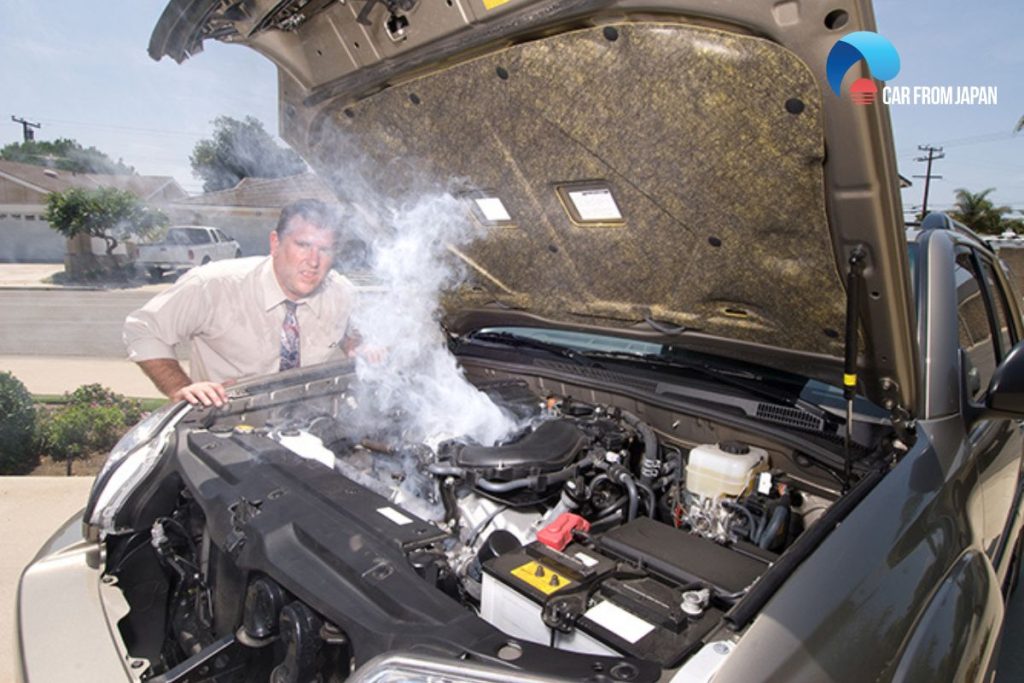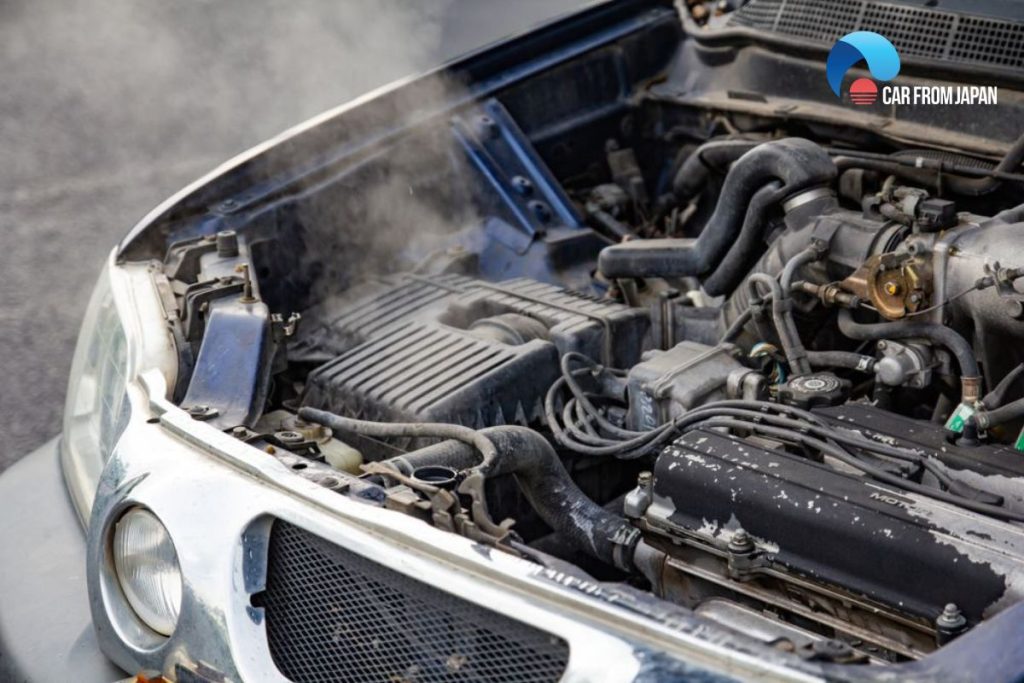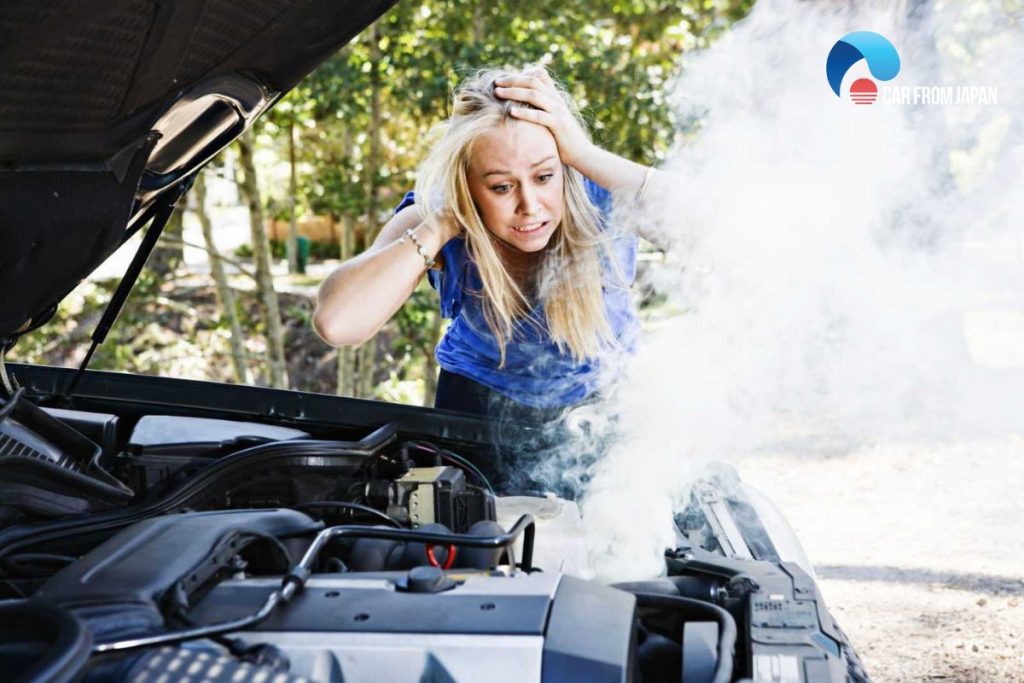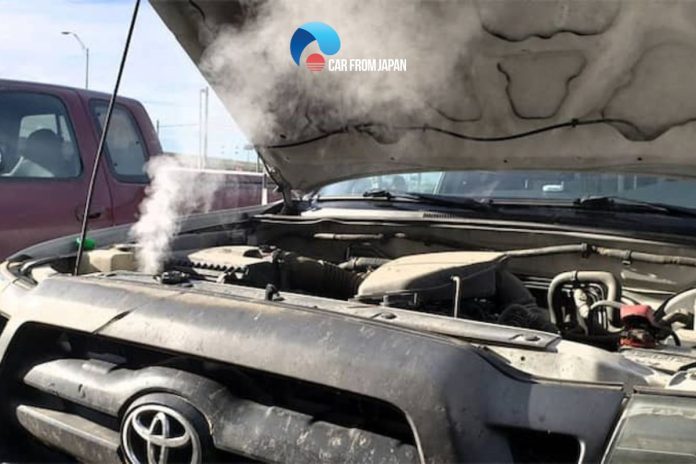What should you do if your car overheating then going back to normal? Overheating causes a lot of serious consequences to your car so that’s why fixing this problem is quite necessary.
If you notice that your engine is overheating periodically, don’t worry! We will cover everything on this topic!
Contents
- Why Is Your Car Overheating Then Going Back To Normal?
- What To Do When Your Car Overheating Then Going Back to Normal?
- How To Prevent Car Overheating Issue On Your Car?
- FAQs on Car Overheating Then Going Back to Normal
- Why does my car overheat at stoplights but cool down when driving again?
- Can trapped air bubbles in the cooling system cause temporary overheating?
- Why does my car overheat with the AC on, then cool off when I turn it off?
- Why does my temperature spike only during aggressive acceleration or towing?
- Can a failing radiator cap cause overheating that disappears quickly?
- Final Words
Why Is Your Car Overheating Then Going Back To Normal?
When driving, the engine temperature will increase to a certain temperature level to ensure the most efficient operation.
Then, the cooling system begins to intervene to help the engine maintain this stable temperature, without continuing to increase higher. Generally, there are many reasons why a car overheats.
The most common cause is a problem with the cooling system or the engine system.
So whether the car overheats then goes back to normal is serious like other overheating cases?
Find out why is your car overheating all of a sudden!

Carry heavy loads
This is a very popular reason for the temporary overheating. Fortunately, there is no mechanical issue in this situation.
Carrying heavy loads such as towing a cargo or trailer will put additional pressure on your car engine and make the overworked engine.
At this time, your engine has to work harder to load more weight, which means that the engine generates more heat while the coolant system can’t dissipate the heat enough and the consequence is that your car overheats.
If you observe the car dashboard, you will see the warning light turn on and turn off until you unload goods from your car.
Towing or carrying too much weight not only causes an overheating engine but overheats the transmission system and puts an excessive burden on the car brake.
Driving in stop-and-go traffic
There are some situations when driving in heavy stop-and-traffic, your car will start to overheat.
Normally, your car will get hotter when the engine is turning faster than when it’s idling but at the same time, the movement of the car produces more airflow through the radiator to cool down the engine.
Lack of airflow will prevent the cooling system from keeping the temperature within the normal level which causes overheating.
Every time drivers stop their vehicles, they must step on the brake at least once and then accelerate again, putting the engine in a state of high-load operation. This is not good for the engine and makes the car engine overheat immediately.
Additionally, braking at high speed and continuously braking will soon cause the car’s brakes to fail. Similarly, continuously pressing the clutch pedal to change gears also causes this part to quickly break.
Climbing steep hills
Your engine is likely overheated while driving on a long steep hill.
The reason is that driving uphill will require the car engine to work harder to meet the force of gravity and remain at the same speed which means that your engine generates more heat but the speed of the air going through the radiator and in the engine has not increased.
An overheating engine is inevitable things in these situations.
A malfunctioning thermostat
The second cause that can lead to a car engine overheating and then going normal is a bad thermostat. The thermostat is a part of the cooling system, responsible for regulating the coolant fluid.
When the engine temperature heats up to a certain threshold, the thermostat will open to allow coolant to flow to the hot part of the engine.
Therefore, when the thermostat becomes stuck, it can operate sporadically and prevent coolant not being distributed to the engine for cooling, causing an overheating engine temporarily.
The fan is not working properly
A common cause of car engine overheating is poor fan performance. The fan is the part responsible for dissipating heat, working with the coolant and thermostat to cool the engine.
If the fan is damaged, the engine’s cooling efficiency will be reduced and lead to overheating.
Therefore, to ensure that the fan always operates stably, car owners need to actively check the fan, quickly detect and handle problems that arise.

Engine problems
In addition to the above reasons, problems within the engine system can easily cause the vehicle to overheat.
For the engine to operate effectively requires good coordination between many parts. The most important of which is the coordination of the air supply system and the ignition system.
If just one of the parts has a problem, it will affect the entire fuel combustion process, and lead to many accompanying problems such as the vehicle overheating.
According to experts, common errors include clogged injectors/early misaligned injection angles, delayed spark plugs, malfunctioning pressure regulators, clogged air filter,… can easily cause the vehicle to report high temperature.
When you’re driving on the road, the engine is under load and burns more fuel, creating heat. That heat must be removed from the coolant by the radiator.
If the cooling system is performing poorly, your car will overheat. A faulty water pump can also cause this phenomenon.
When you stop and let the engine idle, much less heat is released from the engine, so the cooling system can catch up and cool things down.
What To Do When Your Car Overheating Then Going Back to Normal?
Although it’s just a temporary situation, whenever you notice your engine overheating, you should fix the problem as soon as possible. Driving with an overheating engine can damage your car.
If you see the heat gauge go above the red line or H level, steam is coming out of the hood, or there is an oil leak smell, you need to stop the car immediately and check the car’s engine.
Here are some tips to help you handle the situation:
- Turn off the car’s air conditioning and simultaneously open the entire window system to lower the car’s temperature.
- Turn on repair mode and fan if the air conditioner still doesn’t work. It may sound wrong, but trust me, they are extremely effective and won’t damage your car at all.
- When you are in traffic, you can shift the gear to P or N and then rev the engine a little. This will help speed up the water pumping and fanning process.
- If you have followed the above steps but there is still no change, you should stop the car to the side of the road and turn off the engine to let the engine cool down. Then wait about 15-30 minutes for the boiling water to evaporate before opening the hood to check.
- If you have prepared engine coolant on your vehicle, you can add it before moving to the nearest garage or maintenance center.
To avoid overheating the engine, your car needs to be periodically maintained, especially checking and changing the coolant solution, ensuring the coolant level is always at a safe level, and not letting the coolant fall below the “min” mark.
Besides, the engine also needs changed oil regularly.

How To Prevent Car Overheating Issue On Your Car?
Maintain proper coolant levels and condition
Ensure your coolant is always at the recommended level in the reservoir when the engine is cool, as low levels drastically reduce the system’s ability to absorb heat.
Equally important is the coolant’s condition; old or contaminated coolant loses its protective properties and efficiency.
Keep the radiator clean and airflow unobstructed
You should inspect and gently clean the radiator’s external fins of bugs, leaves, and road debris using a soft brush and low-pressure water.
Ensure nothing is blocking the grille or the area in front of the radiator to prevent overheating, especially in hot weather or slow traffic.
Inspect and replace vital cooling system parts
Components like the thermostat, water pump, and hoses wear out over time. You should have these parts inspected during maintenance for signs of wear like cracks, leaks, or malfunctions.
Maintain cooling fans
Listen for the fan when the engine is hot or the AC is on. If you suspect an issue, test the fan system to ensure it’s functioning properly ASAP.
Notice driving conditions and engine load
Avoid overstressing the engine and being cautious when towing loads, climbing hills, or driving aggressively.
If you notice the temperature gauge rising, you can immediately ease off the accelerator, shift to a lower gear if appropriate, turn off the AC, or pull over and wait to cool down the engine.
FAQs on Car Overheating Then Going Back to Normal
Why does my car overheat at stoplights but cool down when driving again?
This often points to a failing radiator fan or fan clutch, without airflow at idle, the engine heats up, but driving pushes air through the radiator, cooling it down.
Can trapped air bubbles in the cooling system cause temporary overheating?
Yes. Air pockets can prevent coolant from circulating properly. Once the air shifts or escapes, flow resumes and the temperature stabilizes, until the next bubble hits the sensor.
Why does my car overheat with the AC on, then cool off when I turn it off?
AC puts extra load on the engine and the cooling system.
If the condenser fan isn’t working or the radiator is restricted, the added stress can tip the balance until the AC is off.
Why does my temperature spike only during aggressive acceleration or towing?
These conditions generate more heat. If your radiator is partially blocked or the water pump is worn, the system may not compensate quickly, but stabilizes once you ease off.
Can a failing radiator cap cause overheating that disappears quickly?
Yes/ A weak cap can’t maintain proper pressure, causing coolant to boil prematurely.
When pressure randomly holds, the system works fine, creating a cycle of overheating and recovery.
Final Words
We’ve just grasped all the information you know on the car overheating then going back to normal issue. Hope this piece of info helps you to some extent.
For more insightful Car maintenance tips, follow Car From Japan today!



